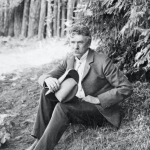1.
today they cut down the oak.
Strong men climbed with ropes
in the brittle tree.
The exhaust of a gasoline saw
was blue in the branches.
The oak had been dead a year.
I remember the great sails of its branches
rolling out green, a hundred and twenty feet up,
and acorns thick on the lawn.
Nine cities of squirrels lived in that tree.
Yet I was happy that it was coming down.
"Let it come down!" I kept saying to myself
with a joy that was strange to me.
Though the oak was the shade of old summers,
I loved the guttural saw.
2.
By night a bare trunk stands up fifteen feet
and cords of firewood press
on the twiggy frozen grass of the yard.
One man works every afternoon for a week
to cut the trunk gradually down.
Bluish stains spread through the wood
and make it harder to cut.
He says they are the nails of a trapper
who dried his pelts on the oak
when badgers dug in the lawn.
Near the ground he hacks for two days,
knuckles scraping the stiff snow.
His chain saw breaks three teeth.
He cannot make the trunk smooth. He leaves
one night after dark.
3.
Roots stiffen under the ground
and the frozen street, coiled around pipes and wires.
The stump is a platform of blond wood
in the gray winter. It is nearly level
with the snow that covers the little garden around it.
It is a door into the underground of old summers,
but if I bend down to it, I am lost
in crags and buttes of a harsh landscape
that goes on forever. When snow melts
the wood darkens into the ground;
rain and thawed snow move deeply into the stump,
backwards along the disused tunnels.
4.
The edges of the trunk turn black.
In the middle there is a pale overlay,
like a wash of chalk on darkness.
The desert of the winter
has moved inside.
I do not step on it now; I am used to it,
like a rock, or a bush that does not grow.
There is a sailing ship
beached in the cove of a small island
where the warm water is turquoise.
The hulk leans over, full of rain and sand,
and shore flowers grow from it.
Then it is under full sail in the Atlantic,
on a blue day, heading for the island.
She has planted sweet alyssum
in the holes where the wood was rotten.
It grows thick, it bulges
like flowers contending from a tight vase.
Now the stump sinks downward into its roots
with a cargo of rain
and white blossoms that last into October.




















Comment form: